IN FOCUS: Stop and stare? The frustration with inconsiderate behaviour on trains and buses in Singapore
There has been a surge in the number of offence notices handed out to commuters since new signs to curb nuisance behaviour were put up. Why do people act like this?
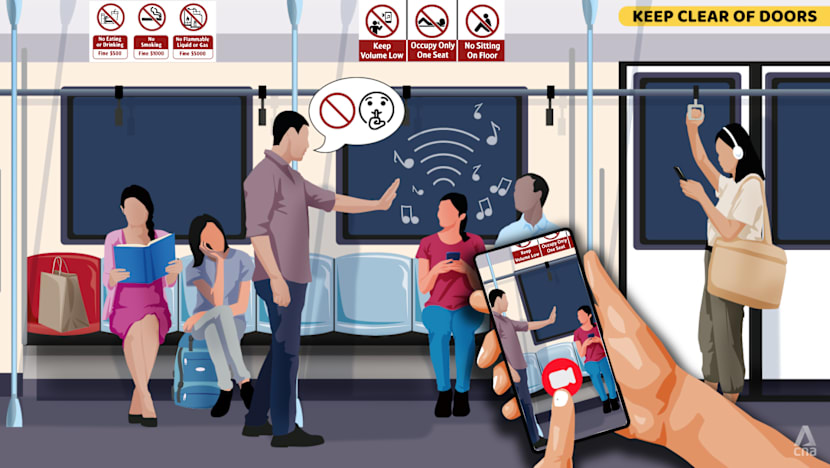
Ignore the inconsiderate behaviour, confront the offending commuter, or record a video of them and upload it online? (Illustration: CNA/Rafa Estrada)

This audio is generated by an AI tool.
SINGAPORE: Among all the ways to be a public nuisance on the bus, blasting music out loud and running around on the upper deck are the most common ones that bus captain Aaron Lee sees every day.
The next most common habit is more bizarre. “Nail clipping. Yes, really,” he told CNA.
“I am also speechless. Why would you cut your nails on public transport when it’s moving and so shaky?”
These passengers tap their cards as they board the bus, find themselves a seat and then start clipping their fingernails and toenails, said the 30-year-old Tower Transit employee. “It’s very unsightly.”
As it turns out, it doesn’t take that long to finish clipping your nails. Most passengers only need about one stop’s worth of time to finish the job, so Mr Lee finds it difficult to intervene, especially while concentrating on his main job – driving the bus.
“Later, they will say, there is no sign. Singaporeans like to use signs as a backup.”
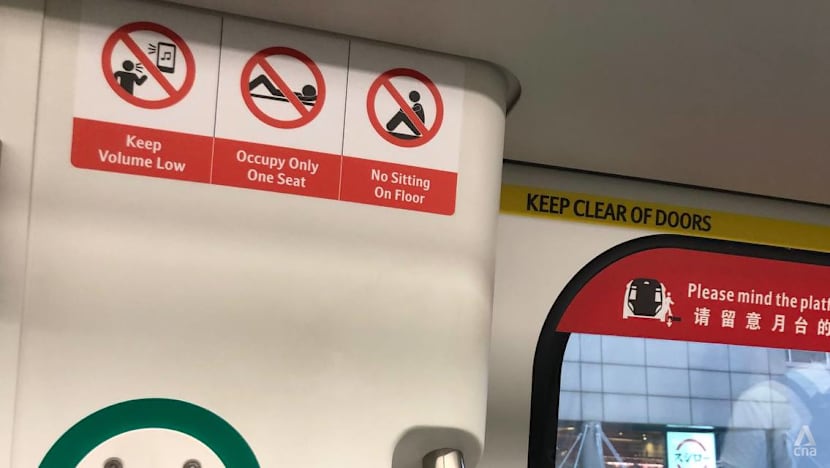
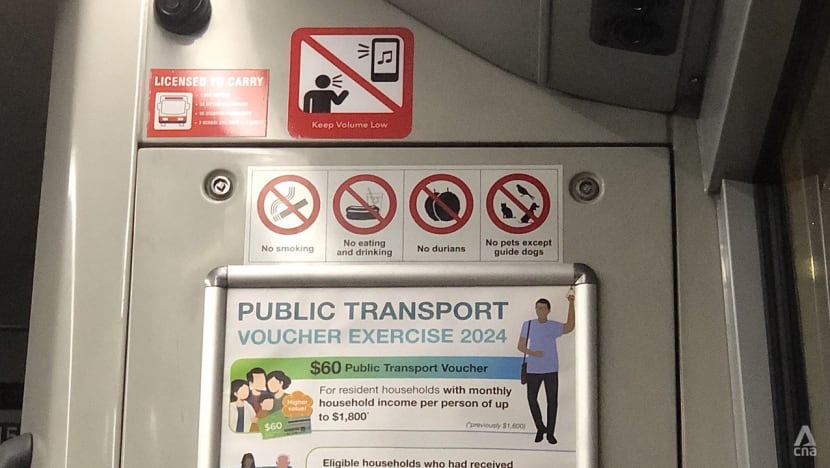
The number of offence notices handed out surged after the signs progressively went up from December 2024.
Between December 2024 and May 2025, more than 160 such notices were handed out on the rail network – four times more than in the preceding six months.
In an update on Monday (Nov 10), the Land Transport Authority (LTA) said 59 such notifications were handed out from June to September. While the monthly average has dipped since June, it was still higher than before the signs were rolled out.
The signs remind commuters to keep noise levels down, avoid sitting on the floor and occupy only one seat. Those related to noise appear on both MRT and buses, while the others are limited to the MRT network.
These notifications carry fines of up to S$500 (US$390) per violation. More serious infractions may result in penalties of up to S$5,000.
WHY DO PEOPLE BEHAVE LIKE THAT?
Every so often, public nuisance cases or more extreme instances of inconsiderate behaviour on public transport end up in court and make the news.
In September, SMRT lodged a police report against a man who filmed himself drinking water next to a No Drinking sign.
At least three men were charged with publicly urinating at MRT stations and on the train.
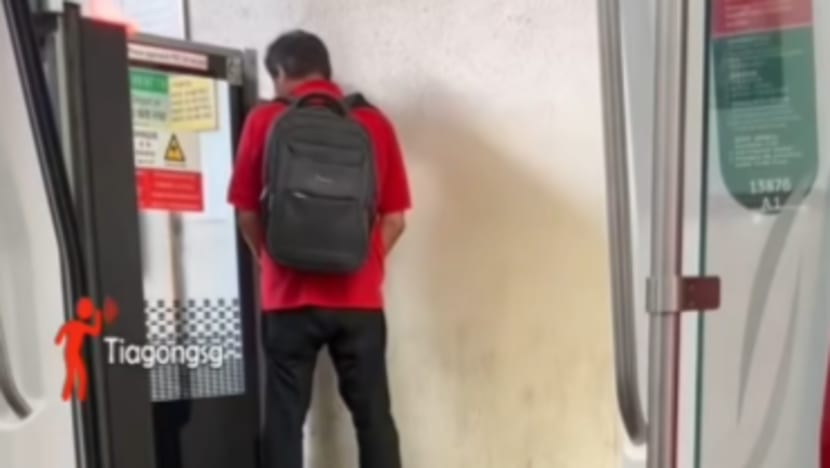
The behaviours cited by those interviewed by CNA are more commonplace – not giving way to those boarding or alighting, not moving in so more people can board, not giving up seats, blasting music or taking calls loudly, and putting their bags or feet on empty seats.
Why do people act like this?
Those who take public transport said they do not understand why others behave as such – some thought they were uncaring or lacked social or spatial awareness.
“I think it stems from a culture of entitlement. Many people seem to believe their own needs take priority over others, without even considering the shared nature of public spaces,” said 31-year-old commuter Ong Xinyee, who takes the train to work regularly.
Some older Singaporeans believe that they have “earned” certain privileges through experience or age and expect to be given priority, while younger Singaporeans may feel entitled because they pay for public transport, said Ms Ong.
“Over time, such behaviour becomes normalised, as inconsiderate acts often go unchallenged – reinforcing the idea that this kind of entitlement is acceptable.”
Some passengers do not care about their behaviour because public transport is a public space, said 27-year-old senior executive Aisyah Aljunied.
“Everyone can use it, everyone can do whatever they want,” she added.
“I guess maybe they’ve never really been stopped before, or there’s no real penalty for it, so they just keep doing whatever they want to do.”
With commuters glued to their phones, getting them to look at where they’re going is a challenge, said Ms Michelle Tay, the executive director of the Singapore Kindness Movement.
Escalators in Hong Kong play recordings that remind riders to look up. Similar “LOOK UP” signs are displayed at some zebra crossings in Singapore, she added.
The Singapore Kindness Movement’s role is to shift “passive acceptance to active reflection”, she added.
“Do we really need to fine Singaporeans if we don’t return our trays? Are we not civic-minded enough or not considerate enough?”
Where public transport is concerned, passengers on different train lines behave differently, and this sometimes has to do with the infrastructure, she added.
For example, commuters are extra efficient at queueing at Bishan MRT station, said Ms Tay, pointing to the yellow lines that were introduced when the Circle Line was first built, which show passengers how they should queue up.
IGNORANCE OR INDIFFERENCE?
Experts agreed that a mix of ignorance and indifference is the likely cause, echoing what the commuters hypothesised.
While most Singaporeans are aware of public norms from years of public education campaigns, this knowledge does not always translate to the individual adhering to them, said Dr Elvin Xing, an anthropologist with the National University of Singapore’s Institute of Policy Studies.
“While it could be a mix of both unawareness and indifference, I would suggest that indifference or perceived anonymity plays a larger role than ignorance,” he added.
“Those engaging in inconsiderate behaviour may feel that they can get away with their actions due to the perceived low risk of censure and minimal social consequences.”
Responding to questions about how character and citizenship education has adapted in the context of increasing intolerance in Singapore, the Ministry of Education said students are taught how to regulate their emotions, stand up against stigma by having empathy for others and make responsible decisions.
The COVID-19 pandemic revealed how children's social and emotional well-being impacts their learning, especially for those who struggled with isolation, anxiety and disrupted routines, said the ministry.
Students also learn about concerns arising from the use of social media, including mob mentality, the far-reaching consequences of online expressions and their impact, as well as the laws, regulations and ethics of online communication.
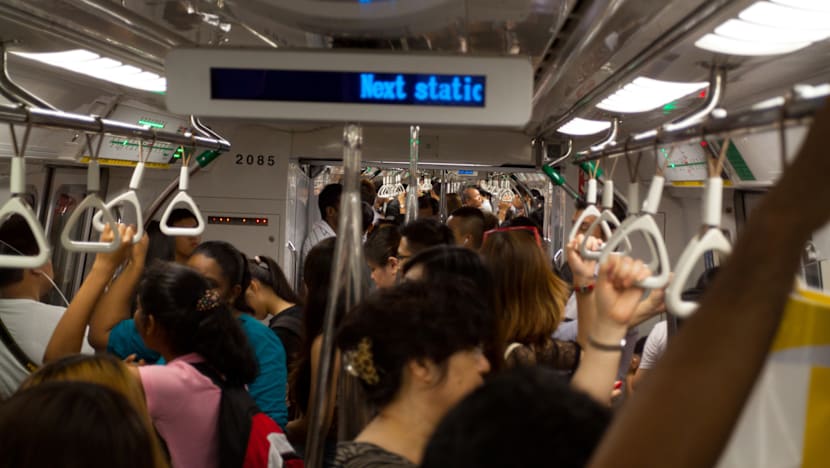
Even though there are efforts to align regulatory frameworks and penalties, the day-to-day reality may still be that someone who plays loud music or puts their feet up on a seat is unlikely to be immediately confronted by transport staff, said Dr Xing.
Some people may fail to recognise the impact of their behaviour on others because they are too absorbed or distracted by an activity – listening to music or watching videos, said Dr Janice Tan, a clinical psychologist with the Singapore University of Social Sciences (SUSS).
For example, if someone is used to watching videos on their phones at a loud volume and this is not frowned upon at home, they may then do this outside of their home because they think that it is ok, she added.
“That said, there will be others who are aware that their behaviours are inconsiderate but choose to still engage in them either because there might be no immediate consequences or that the transient nature of public transport can lower personal accountability,” said Dr Tan.
CALLING THEM OUT ISN’T EASY
Based on what commuters shared, grousing about inconsiderate behaviour on trains and buses appears to be a national sport.
Ms Aisyah said that these incidents also often become lunchtime conversation at the workplace. “It’s just a universal Singaporean experience at this point.”
In spite of their grievances, this doesn’t necessarily translate to action. Most of those CNA spoke to said they usually do not go beyond saying “excuse me” to commuters blocking their way or asking other commuters if they were willing to give up their seats for someone who needs it more.
If someone is trying to board the train without waiting for others to get off, Ms Aisyah said she would usually say “excuse me”, but in an irritated tone.
“It’s more because I genuinely need to get off and people tend not to move … people don’t look, they don’t hear. I try not to start a fight, especially if it’s elderly pushing, they will not take it well.”
She doesn’t know what to do when she encounters people who play their music out loud on the train. “I hate it but I feel scared to ask them to lower their volume.”
“I feel uncomfortable because technically what they’re doing is not illegal, but the fear … comes from me thinking that they will lash out at me or make a scene, even though actually I’m not doing anything wrong,” said Ms Aisyah.
Mr Meerah Sahib Abu Bakar, 76, a retiree, is particularly bothered by misbehaving children on trains, especially when their safety is at risk and their parents do not stop them.
Passengers who are glued to their phones and do not notice that they need to give way to others are also common, he added.
He chooses to ignore these passengers entirely because he doesn’t want to cause any problems.
“Of course, I’d be very angry by myself, but I wouldn’t dare to speak up, because not everyone understands. I’m afraid it might lead to a brawl … or quarrelling in public.”
THE BYSTANDER EFFECT
In the context of correcting strangers’ inconsiderate behaviour on public transport, direct and interpersonal intervention is not normalised in Singapore, said IPS’ Dr Xing.
“Most commuters find it difficult to tell off those engaging in inconsiderate behaviour on public transport primarily due to conflict avoidance and the fear of negative repercussions,” he added.
This is magnified in the confined environment of public transport, said the anthropologist, adding that like Ms Aisyah, commuters might be scared that saying something could escalate the situation, especially when they cannot predict how the offender will react.
“Also, some commuters feel that even if they speak up, it will not lead to a change in behaviour, and the offending commuter may just ignore them or refuse to cooperate,” said Dr Xing.
All the experts and commuters CNA spoke to pointed to the bystander effect.
“This occurs when many people are present, each assumes someone else will intervene, so no one does,” said the IPS anthropologist.
Others not taking action also reinforces the individual’s decision not to act, he added.
In Singapore, many people typically believe that these social norms are supposed to be enforced by bus drivers, the police and so on, said Assistant Professor George Wong, a sociologist with the Singapore Management University (SMU).
The public may hesitate to step up because of the social cost of confronting someone – they could be afraid that they have misjudged the situation and are jumping to conclusions, or that the confrontation may be filmed by someone else, he added.
“It is easier to let somebody else do it, hoping that somebody else may actually step in.”
If no one tells them to stop, the offending commuter may think their behaviour is tolerable, and continue to do so if they think they can get away with it, said Asst Prof Wong.
Singapore does not have a culture of calling people out, and children are often taught to mind their own business and avoid unnecessary confrontation, said Ms Ong.
“As a result, many people would rather tolerate inconsiderate behaviour than risk creating an awkward scene in public,” she added.
When any small incident can easily be recorded and shared online, people are more hesitant to speak up for fear of being judged or misunderstood, said Ms Ong.
When other passengers talk loudly on their phones or take calls on speaker mode, Ms Ong will make eye contact or “give them a good stare” – most of the time, they get the hint and lower the volume.
“I’ve noticed this happening more often among the older generation, while the younger tend to alight and take their calls if needed,” she added.
She has also come across older Singaporeans who stand in front of an occupied reserved seat, assuming that anyone who looks younger should give up their seat because it is “reserved for them”, she shared.
“They may not stop to think that the seated person could have an invisible condition.”
The 31-year-old has also noticed more middle-aged commuters telling people off when someone else requests the reserved seat they are sitting on.
“In such cases, I would usually help the person in need look for another seat nearby, or ask others if they are willing to give up their seat.”
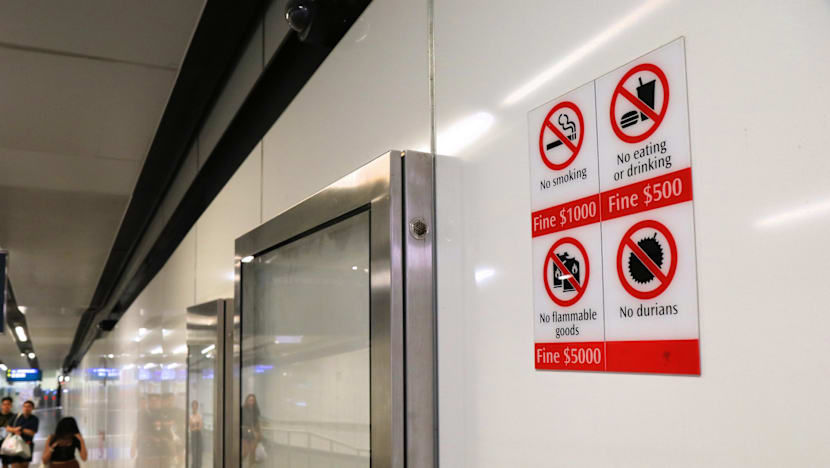
Senior lecturer Joan Ho said she typically only intervenes when she sees someone who needs a seat.
In helping them find one, she makes sure to ask other commuters gently and respectfully if they mind giving up theirs, and will explain her intention, for example, to help an elderly passenger who has weak legs.
“Compassion for people who have more challenges drives me to do so … Maybe eight out of 10 (passengers) are quite ok,” she added.
As seen in videos posted online, commuters who take issue with being confronted usually take offence at the way they are approached, when it comes across as a “personal attack”, said Ms Ho, who teaches in a polytechnic.
“I think for us, when we ask someone, it’s important how we ask it, the tone and all.”
Everyone has different tolerance levels, she added. For example, someone who is sitting opposite a passenger blasting music out loud on the train may not be able to hear much because of the rumbling sounds, and may not mind it as much.
Mr Lee, the Tower Transit bus captain, usually gives a passenger who is blasting music out loud a few stops before he tells them to lower the volume.
Most of these passengers are simply not aware of their surroundings, he added. Some elderly passengers also do not know how to use headphones or earphones, said Mr Lee.
Usually, most passengers apologise and comply with his request. Once, a passenger who “wasn’t happy” about being confronted alighted and banged on the glass door, Mr Lee shared.
Another older commuter responded: “Why? I’ve seen more things than you. I’ve eaten more salt than you. So you just drive.”
“They just say that because they don’t want you to tell them what to do,” Mr Lee said, noting that other colleagues have encountered commuters who were uncooperative and difficult, even activating the authorities to step in.
Bus operator Go-Ahead Singapore said it has clear protocols to handle passengers behaving inconsiderately.
Bus captains are trained to advise the passenger to stop the behaviour. If they remain uncooperative or become aggressive, the bus captain will seek guidance from the bus operations control centre.
The control centre will assess the situation and advise the bus captain to take the appropriate actions, prioritising the safety of the passengers and maintaining the bus service.
Depending on the situation, the bus captain may continue with the bus service, request assistance from the police or ask the passenger to alight.
Listen:
POLICING BEHAVIOURS, AVOIDING CONFRONTATION
Despite their frustrations, commuters generally agreed that they would not shame errant travellers online and that it was likely to do more harm than good.
Ms Ho noted that exposing someone on social media can be considered a form of bullying, which may backfire and result in more serious consequences.
Embarrassing someone to make them stop their behaviour may be effective, but this needs to be exercised with caution, she added.
"I don't think they should be posting it online to begin with," said Ms Ong, adding that it would additionally deter people from standing up to inconsiderate commuters.
Ms Aisyah said she was "on the fence about it". "I don't feel it's right to take people's pictures without their consent, and it opens up the risk of doxxing."
On the other hand, naming and shaming these individuals may sometimes be the only way they can be punished, or realise what they are doing is wrong, she added.
Experts described the online shaming of public nuisance cases or inconsiderate behaviour as a “low risk, high reward” response from commuters.
“It allows them to engage in conflict avoidance while still seeking a form of justice through public outrage and shaming,” said Dr Xing, adding that posting on platforms like Stomp or Reddit allows commuters to vent their frustrations while gaining validation and empathy from others.
Some passengers may genuinely believe that they are serving a public good by exposing and highlighting unacceptable behaviour, hoping to set a better social standard for others, he said.
SUSS’ Dr Tan said uploading these photos or videos online may let affected commuters “police” these behaviours while avoiding personal confrontation or risk.
“While this can potentially deter some misbehaviours, underlying it is a public shaming mechanism, which can backfire as it can lead to further online shaming and harassment.”
CAN WE RELY ON SIGNS AND FINES?
Does this mean that the signs and the public nuisance fines are really necessary? Or is becoming “more courteous by default” on the cards for commuters in Singapore?
For now, signs are necessary to set clear norms for commuters, experts agreed. Commuters also said the signs make it easier to decide when to intervene.
This is because they reinforce shared expectations without confrontation and signal that certain behaviours are not just personal preferences, said IPS’ Dr Xing.
Instead, these behaviours are part of a “collective understanding of public decency”, he added.
Intervening after spotting inconsiderate behaviour should be characterised as civic courtesy, not censure, said Dr Xing.
“If gentle reminders, either from fellow commuters or transport staff, became an accepted part of public life, many minor infractions can be resolved immediately, respectfully, and without escalation.”
As for fines, they can be effective in the short term, but their long-term impact is limited, he said, adding that they can form part of a broader ecosystem to encourage civic consciousness, rather than the “main component”.
“We can't list down and attach a fine to each and every act of errant behaviour,” he added.

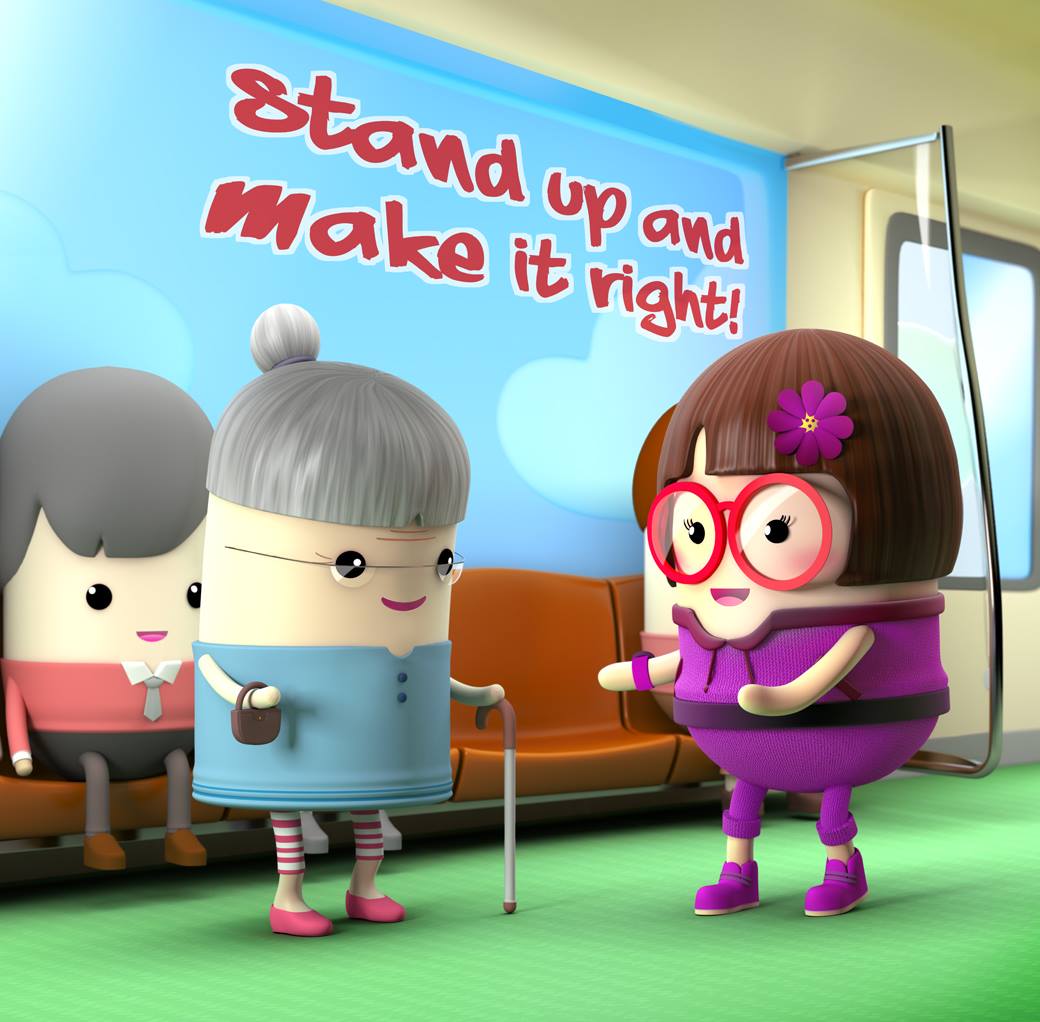
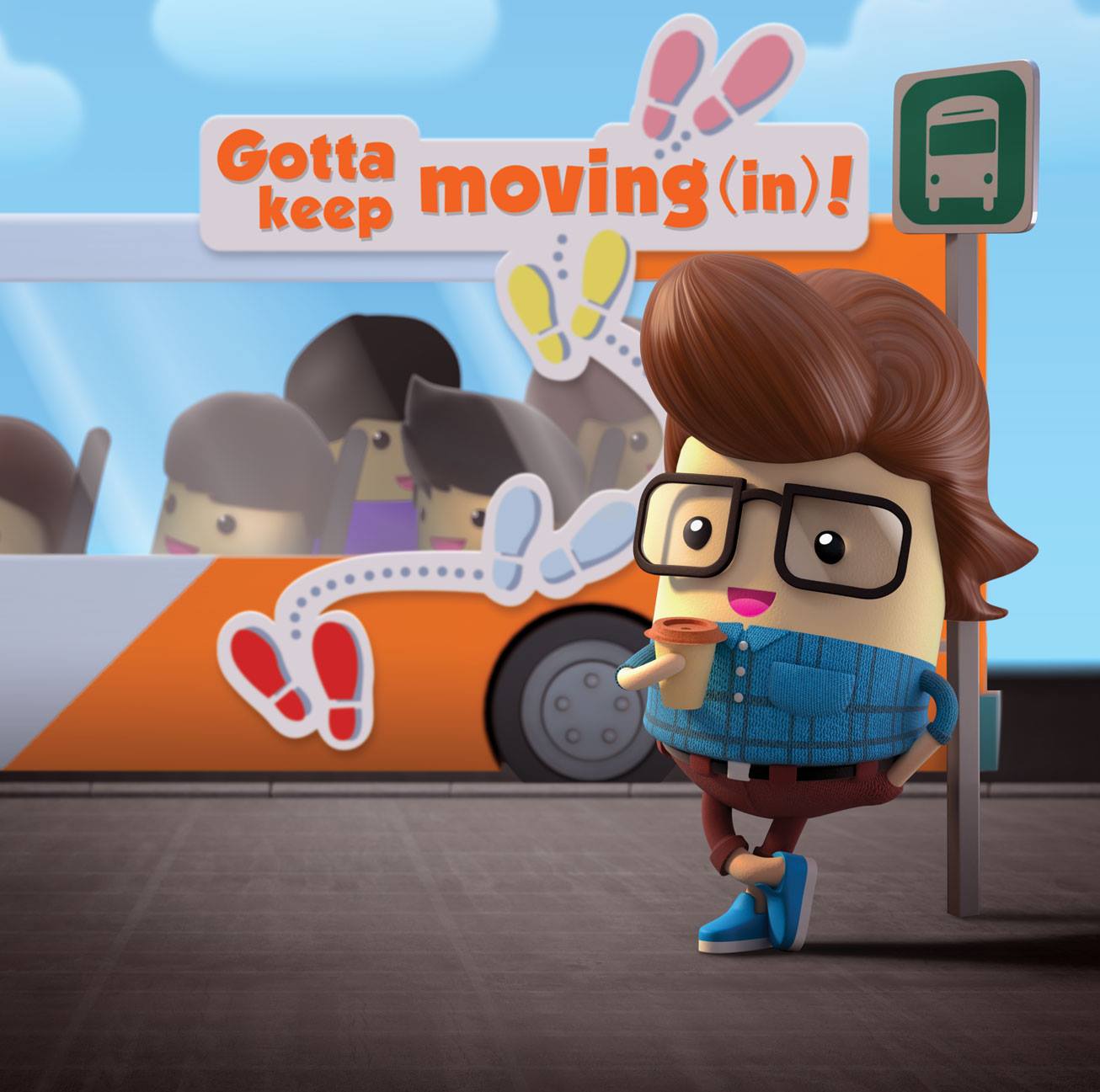
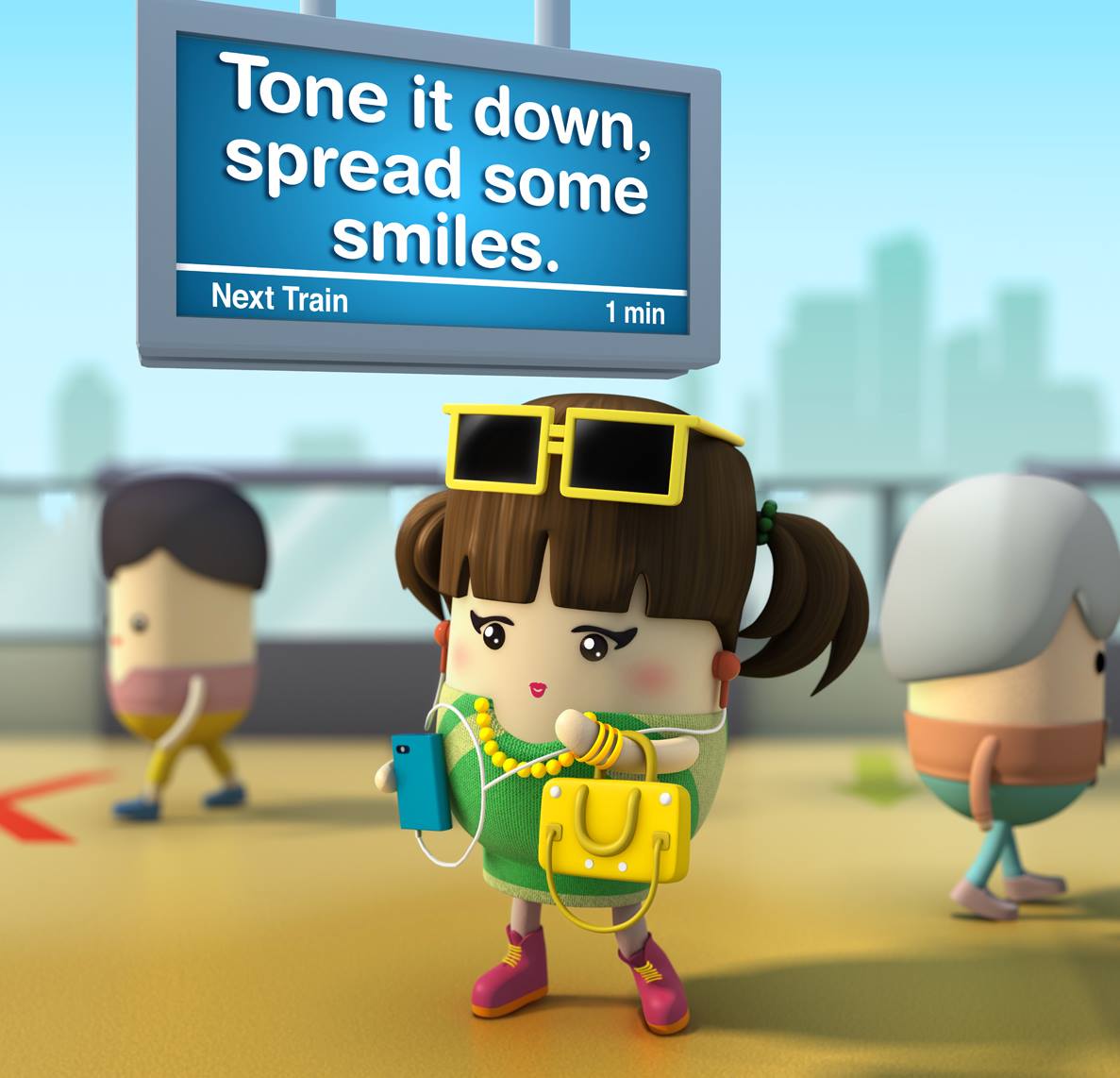

Characters like Bag-Down Benny and his friends, who were introduced in 2014, represent the top five behaviours that campaigns to improve gracious behaviour on public transport are focusing on.
The signs also lend a little strength to commuters who want to intervene, they shared. For example, a commuter who used to find it difficult to tell someone blasting music loudly to turn down the volume can now wordlessly point at the sign instead of asking them to do so directly, said Ms Tay.
“Kindness takes courage,” she added. Recognising good behaviour can help to encourage others to behave graciously too, said the executive director of the Singapore Kindness Movement.
“We always talk about feedback, but actually it’s become a complaint ground, if I’m not satisfied with this, then I’ll complain,” said Ms Tay, who has been with the organisation for 19 years.
“I always like to believe kindness is a two-way street. If we could give compliments, it would also encourage or affirm people in the transport sector that it's not just a job. To them, it's really inspiring them or keeping them (there).”
Public transport officers “can only do that much”, said Tower Transit’s Mr Lee, agreeing that he would much rather other passengers help to school offensive commuters on their inconsiderate behaviour.
Being gently reminded by a fellow passenger is also less embarrassing than being confronted by the bus captain, he noted.
“We just hope that everybody plays their part, and public transport is a shared space. We cannot always remind you at every stop to lower your volume … It would be delaying everybody’s time.”

















